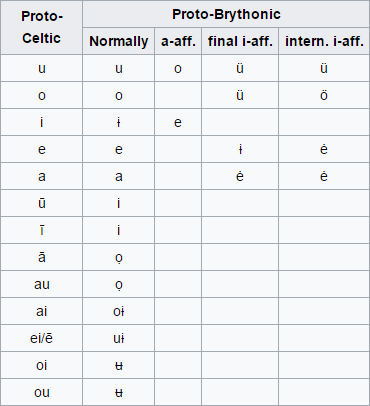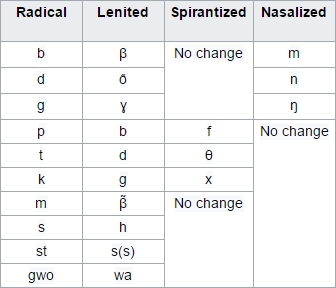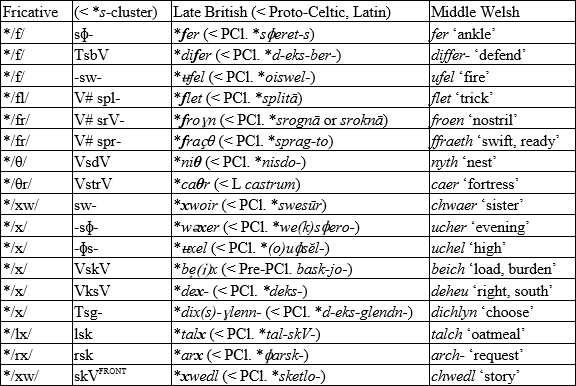This page is talking about the changes undergone by Proto-Celtic to become Proto-Brythonic, and then the changes Proto-Brythonic underwent to become Loegrish.
Proto-Celtic to Proto-Brythonic
Vowel development
Here is a table listing the vowels and diphthongs of Proto-Celtic and their equivalents in Proto-Brythonic, under normal circumstances as well as under final i-affection, final a-affection, and internal i-affection:
Abbreviations:
a-aff. - a-affection
i-aff. - final i-affection
intern. i-aff. - internal i-affection

(table from here)
Vowels in the penultimate syllable can be affected if the final syllable has a long [iː] or [aː]. This is called "affection".
I-affection occurs when the final syllable has a long [iː] sound or a [j] sound. The penultimate syllable's vowel becomes fronted and (if possible) raised.
- /e/ becomes /i/ (this is the one instance when a short [i] in the final syllable can also cause i-affection).
- /a/ becomes /e̝/, which is a raised/e/.
- /o/ and /u/ become /y/.
A-affection occurs when the final syllable has a long [aː] sound, in which the short high vowels /i/ and /u/ are lowered to /e/ and /o/, respectively.
Vowel affection can also occur inside of a word. Internal i-affection is about the same as final i-affection, except the [iː] sound is inside the word.
- /e/ and /a/ become /e̝/.
- /u/ becomes /y/.
- /o/ becomes /ø/.
Syncope refers to the dropping of unstressed vowels, and it's usually the connecting vowels of compound words that are dropped. This usually triggers provection (see below, under Consonant development).
Consonant development
The greatest change Proto-Brythonic consonants go through is consonant mutation.
Lenition is the action or process by which a consonant's articulation is weakened or becomes more sonorous (vowel-like). In Brythonic languages, lenition is when voiceless stops become voiced stops in between vowels, within a word or across word boundaries. For example: Proto-Celtic *rīganī > Proto-Brythonic *riγe̝n, Proto-Celtic *esyo tegos > Proto-Brythonic *esyo degoh.
Spirantization is the action or process by which a plosive consonant (/p, t, k/) is changed into a fricative (/f, θ, χ/, respectively). In the Brythonic language family, spirantization is what causes geminate voiceless plosive consonants (/pp, tt, kk/) to become fricatives ([f], [θ], and [χ], respectively). It also affects these consonants within a word or across word boundaries in the environment of the letter /h/: Proto-Celtic *esyas tegos > Proto-Brythonic *esyas θegoh.
Nazalization is when a consonant becomes nasalized. It occurs within a word or across two words, when the consonant is next to a nasal consonant (n, m, ng).
The following is a table of the effects each phenomenon has on each consonant.

Provection is when the unstressed medial vowel between two lenited consonants drops (see syncope), and the two consonants assimilate into one voiceless plosive. This happened too late in the development of Proto-Brythonic for the plosive to then spirantize or lenite. For example, the word *klokopenno-, "skull", first became *klogobenno (lenition), then *klogbenn (syncope), then klopenn, the Breton word for "skull". This often happens with suffixes, especially comparative suffixes: *kaletisamos > *kaledihaβ̃ > *kaledhaβ̃ > caletaf (the Welsh for "hardest").
With the lenition of /s/ into /h/, many Proto-Celtic consonant clusters became voiceless fricatives or consonant clusters involving voiceless fricatives. Following is a table of all of these changes.

Some minor changes: /sl-, sm-, sn-/ become /l-, m-, n-/, respectively. /mr-/ becomes /br-/. /kw/ becomes /p/. /lt, rt/ become /lθ, rθ/, respectively.
Proto-Brythonic to Loegrish
Vowel development
Abbreviations:
L - liquid consonant (/r/ or /l/)

Long [i] and [u] become [aɪ] and [aʊ], respectively.
Consonant development
Proto-Celtic *mb
In Welsh, Cornish, and Breton, the Proto-Celtic /mb/ becomes /m/. This development must not have occurred in the Proto-Brythonic period, since it took longer to take hold in Cumbric. In Loegrish, there is evidence to suggest that the situation was the same as that of Cumbric. The Anglo-Saxons and their language halted the development of many typical Brythonic sound changes (while also taking over a handful of loanwords, grammatical constructions, and proper nouns). Anglo-Saxon loanwords (e.g. cumb) retain /mb/, but, by the Middle English period, these words as well as place names dropped the pronunciation of the [b]. This suggests that Loegrish would have followed the same path anyway. Confer the modern pronunciation of words such as "comb".
Proto-Celtic *rk
Welsh, Cornish, and Breton have [rχ] where Proto-Celtic has /rk/. Again, this change was late to Cumbric, and what little evidence exists for Loegrish is inconclusive. While the element *torkos ("boar", cf. Welsh twrch) exists in the name of Pentric (modern-day Pentrich and Pentridge) as retaining the [k], the Old English word lorh, "pole, distaff" (< PC *lorgā, cf. Welsh llory, Cornish lor(gh) "cudgel") would suggest otherwise. For my own purposes, I have chosen to include the the change from /rk/ > [rχ].
Initial *w
Though the development of Proto-Celtic /w-/ into /gw-/ is so ubiquitous in Brythonic, I have found no evidence that it could have happened in Loegrish. Confer place names such as Wynford, Wenlock (< PC *windos, "white", Welsh gwyn, Cornish gwin), and Wawne (cf. Welsh gwaun), as well as the Anglo-Saxon wann "wan" (< PC *wannos).
Proto-Celtic *-iyo- > Brythonic -ið
Loegrish displays the change from Proto-Celtic *-iyo- to /ið/, just like Welsh (mynydd, "mountain"), Cornish (menydh), and Breton (menez), in place names such as Little Mynd and the nearby Myndtown (< PC *moniyo-, Loegrish mind). Another example is PC *nowiyos > Loegrish niwd. The /i/ has been dropped by syncope.
Devoicing of final consonants
This is a phenomenon found in Breton and occasionally in Cornish and Cumbric, where the final consonant will change from /b/ to /p/, /g/ to /k/, and /d/ to /t/. In older forms of Welsh, these sounds were interchangeable at the ends of words. Loegrish also has this capability.
Proto-Celtic *kt and *x
The development from Proto-Celtic *mrictos to Welsh brith, braith is also evident in Loegrish, with *oxtu becoming waith (cf. Isle of Wight). Proto-Celtic *kt becomes [jθ], and *xt, *xs, *gt, and *gs become [js].
Proto-Celtic/Brythonic *g
When Proto-Celtic or Proto-Brythonic *g comes at the end of a syllable, it becomes [j]. This will usually cause a diphthong, which then followss the changes in the chart above.
Next: Page 2: Loegrish Sounds